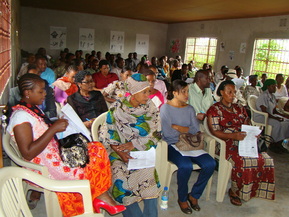
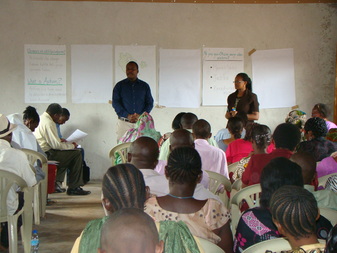
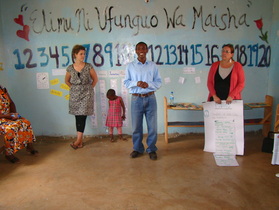
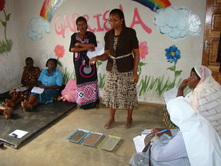
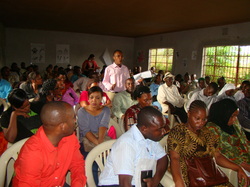
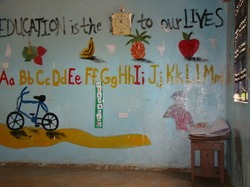
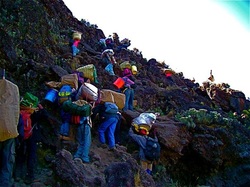
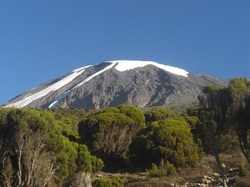
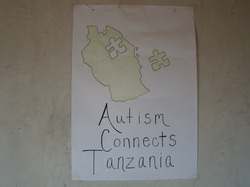
www.razoo.com/story/Stepping-Up-For-Special-Needs
Thanks for your support! Miss you all!
| Wazungu Wanderings |
|
One of our big goals this year while in Tanzania was to develop our Autism Connects Program. With the Kilimahewa Education Center finally running smoothly and the water project underway and fully funded we are now able to turn our attention to the Autism Project. To do that we have been networking with different organizations and helping to plan out our direction. This week we have been preparing for some upcoming trainings we have on intellectual disabilities. This past Saturday we hosted our first workshop and through our networking were able to empower 5 professionals to lead the workshop on intellectual disabilities. We had over 120 people in attendance from all parts of Tanzania and the group was made up of parents, teachers, therapists, childcare workers, and some children. It was a diverse group of people with very different levels of knowledge about autism and intellectual disabilities.  We started the conference by introducing everyone and discussing the causes of intellectual disabilities. We had a large spectrum of reasons people believed were the causes of intellectual disabilities. People suggested things such as drinking and smoking while pregnant to curses from witchdoctors and every cause was discussed. We had people talk about how they heard a child can get autism if their mother drinks too much water while she is giving birth or that if the parents want wealth more than children they will be cursed with autistic children. It was quite interesting to have so many people from different backgrounds in the same room because they were able to help each other address the myths that exist around the causes of intellectual disabilities. I am not sure if everyone was completely convinced in the end that witchdoctors and evil (these are long time cultural beliefs) are not the main causes of disabilities but it was an amazing discussion and everyone left with new perspectives.  After learning about the causes of intellectual disabilities and some of the basic characteristics we moved on to how these characteristics lead to a large stigma that impacts the lives of all who interact with special needs children. Parents talked about how other people in their villages treat them like they are dangerous or diseased. Parents talked about how schools won’t take their children and leave them with nowhere to go. Teachers talked about how they are not trying to stigmatize parents but that they do not have enough support in the schools to support severe disabilities in a classroom with 20-30 special needs kids and one teacher. Some parents and teachers were able to for the first time see each other’s point of view. One father talked about how he was scared to take his child out in public because he were worried people would harm or kill his son if he misbehaved. Teachers talked about how they are often also stigmatized as bad teachers because when school inspectors come to their classrooms students behave differently than other classrooms and often teachers are accused of not working hard enough to “fix” their students. While I listened to these stories I thought how some of the teachers and parents here in Tanzania were having very similar conversations that families and teachers in America were having but with a different level of support offered. We discussed how working with special needs children requires a very strong heart and desire to help and how this is not something that can always be taught and acknowledged that all the people in the room cared enough to learn more and where there for a reason. We continuously encouraged everyone to talk to each other and try to find solutions to problems through conversations with each other.  After discussing the stigma we had people share the ways they have fought against the stigma and the ways they have stepped up for their special needs children. A mother talked about how she held an emergency session of the community to inform them about her child because she had heard stories that the community was threatening to kill him because of his misbehaviors in town. Another father talked about how he took his child out of the country to the UK for help because he did not feel like people in Tanzania could help him. Two therapists talked about how they started an integrated early childhood program welcoming kids with and without special needs to try to teach families that others cannot catch disabilities. Another mother talked about how she made t-shirts for her son to wear that said “Don’t hurt me, I am autistic. Please call this number ….. if I need help.” A teacher talked about how she is working with her school to allow kids with intellectual disabilities to attend her vocational program and although she does not know how to help them she hopes it will give students a place to go when they finish primary school. It was pretty amazing for others to hear how they are stepping up against the stigma and trying to help these children be safe, be educated and have opportunities in life.  As Jillian and I continue to do work here we are really hoping to help some of the amazing program we have found. Next week we will be hosting a second workshop with an organization called Building Caring Communities. This organization has 11 centers around Moshi working with kids with intellectual disabilites. We will be working with them on developing teaching strategies that can be used in their centers and publishing a collection of resources to give to each center and other schools and centers in the area. Next month we then have another training with the Imani Vocational Center to talk about basic special needs teaching strategies that could be used in their vocational school. We are hoping our training series this past month helps create a new knowledge and empowers professionals working with these children to be leaders in fighting the stigma that exists around special needs in Tanzania.  This amazing experience this past weekend could not have been possible if it were not for our developing partnership with the Gabriella Center and the two young professional occupational therapists, Brenda and Anthony, who are working so hard to develop their programs to help kids with intellectual disabilities. Brenda and Anthony are working to help kids with intellectual disabilities by creating an integrated curriculum, having weekly therapy programs for children and parents, and having a long term intensive residential therapy programs. They are also working hard to fight the stigma by holding outreach programs within the community to educate about disabilities and have worked with a variety of organizations to start some of the earliest research on kids with disabilities in Tanzania. Their outreach program is working to unite different organizations to approach communities as a united front of many working to help families and fight the myths and stigma that exists here.  Other than our training series Jillian and I are looking to help support the Gabriella Center financially to fund a teacher, therapist and the outreach work they do and raise the funds to publish the special needs resource booklet we are working to create in our BCC training. We our hoping that through our support these groups can continue to the amazing work they do educating on myths and stigmas and empowering others to become activists to help these amazing children be safe, educated and have opportunities in life.  To raise the funds to do this Jillian and I will be climbing Mount Kilimanjaro in June and will be asking for support. It is our hope that we can help make a difference in the lives of kids with special needs by raising $15,000 through trekking the largest mountain in Africa and the largest free standing mountain in the world. We are hoping that the money we raise from this climb will help us help these amazing organizations.  Honestly, this climb scares the heck out of me and I am not sure if I will be able to make it to the top but I am willing to take the risk to fight against the strong stigma that exists here around people with disabilities. I believe that these kids are special and have so much life and spirit to offer the world and with additional support I truly believe that through empowering organizations here fighting the stigma these children will have a chance at a better life and their families will have more support and help.  We are looking for donations to help us as well as people willing to host fundraisers to help us collect donations. Please check out our Razoo Page for more information and help us Step for Special Needs!
www.razoo.com/story/Stepping-Up-For-Special-Needs Thanks for your support! Miss you all!
0 Comments
What a week for EdPowerment! This week our third partner in crime and our EdPowerment Founder, Moria Madonia, came to visit and help us finalize some plans for Edpowerment, as well as participate in some amazing EdPowerment events. It was a crazy week with lots of amazing things as well as a chance to laugh at some of the craziness we experience while working in another country. Check out the big events below and our website to find out more about what we are doing (www.edpowerment.org): 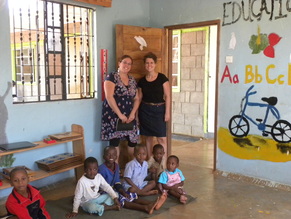 Finalize plans for ACT: Meet with BCC & Gabriella Center One of the things Jillian and I have been working on while in Tanzania is finalizing our plans for our third program, Autism Connects Tanzania. We have been networking with different organizations and meeting with different people about what services are available for kids with intellectual disabilities such as autism. Through the last few months we have determined that there are different organizations that exist but that they struggle to communicate with one another about their programs or their activities. We also noticed that there is a huge stigma here surrounding kids with disabilities, which leads to parents not wanting others to know they have kids with special needs. So this week we worked on finalizing our plans for ACT. We decided that through Autism Connects Tanzania we were going to work on fighting that stigma through a yearly educational workshops and a resource fair to help educate on intellectual disabilities and the services available within the Northern Region of Tanzania. We also plan to work with different organizations to develop structured schedules that include education activities within their centers and create a publication of different educational activities to help kids with disabilities that we can distribute to anyone who may benefit. It is our hope that through this publication we can help support those doing great work here with new ideas about how to educate kids with intellectual disabilities using the least resources possible. We also were able to edit and develop our Autism Connects Tanzania website (www.autismconnectstanzania.org) and communicate with some larger Tanzanian informational websites about advertising educational services available online. We were able to take Moira to meet and visit the two centers we are going to work with the most to develop these workshops and materials- Building Caring Communities and The Gabriella Center. Stay tuned for more blog posts on these organizations. 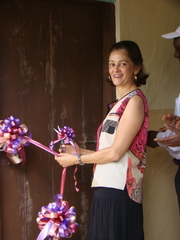 Samburai Primary Schools: Opening of Classroom and Teacher Living Quarters Last year, two primary schools in the Samburai Ward (our main area of focus) approached EdPowerment about finishing two of their building projects. The Samburai Primary School was working to build a new classroom for their nursery school program and the Mary Bennett Primary School was working to build a teacher’s living quarters to house highly qualified teachers from areas further away. Both schools ran out of funding half way through their projects and were looking for support from EdPowerment to finish the projects. After a written proposal and estimate we agreed to fund the projects and this week we were able to participate in the opening of both of the building projects. This ceremony was a big deal attended by village leadership, parents, teachers and students. The school officials prepared a ribbon cutting ceremony and read a thank you letter from the community. The nursery school children and teacher that will be using the classroom came into the room and sang to us. It was a very nice affair but the most rewarding part was seeing the building finished and knowing that through our supporters we are helping to provide better educational opportunities for the children and a better teaching environment for the staff. 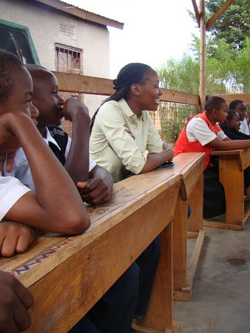 Doctor Visits Kilimahewa to talk about Career and Healthcare Over the last few weeks our Kilimahewa afterschool leadership group has been exploring different careers within the Tanzanian community. Different speakers have come to talk to the students about what is involved in their career and what type of schooling is required to obtain that career path. Some of the speakers have included: A Safari Guide, A lawyer, A taxi Driver & NGO worker, A Community Developer, A Village Leader, and A Mountain Porter. The goal of this program is to inform the students of Kilimahewa about the different career fields that they would not have exposure to otherwise. This past month in Tanzania many of the doctors in the country went on strike asking for more wages and better treatment from the government. While this was difficult for many people to deal with the doctor shortage, most people were generally supportive of the doctors. This week we had a doctor come to speak to the after school group. She was a doctor from Kilimanjaro Christian Medical Center (one of the only teaching hospitals in Tanzania) and was our first ever female speaker and the most educated person that has come to talk to the students. She talked to the kids about her schooling and her profession and the current situation in Tanzania. Many of the students were listening to her every word and very interested in what she was talking about, but I was most impressed when one of our students, Joseph, started asking her about the level of corruption in the hospitals and what the hospitals are doing to make sure healthcare is equal to all. This started a larger discussion where a few of the kids discussed how they have felt they were unfairly treated within the hospital system and our speaker had to explain what leads to corruption and defend that there are people in the healthcare system of Tanzania that do want to help people and that not everyone is corrupt. It was a very interesting discussion and it was no surprise that when the doctor asked Joseph what he wanted to be he stated he wanted to become a lawyer. When asked why, his answer was, “When people here have jobs in the government they think they are above the law. That is wrong and I want to change it.” For me this afterschool group session reminded me why it is so important to bring in people from the community and expose kids to others that have different perspectives. It can lead to very interesting discussions and everyone can teach each other new ways of looking at the world. It is one of the things I love about teaching and I am so happy that Jillian and I have been able to start such an awesome program here. We are hoping to type up our leadership curriculum and also publish it for other centers and organizations to use to help develop some leadership skills with the Tanzanian community. 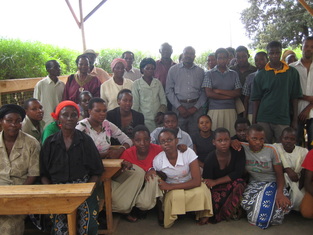 Visit to Mrike Secondary School to visit 14 sponsored students Another thing that we did this week while Moira was visiting was visit some of the sponsored students we have within private boarding schools within Northern Tanzania. We currently are sponsoring 25 students in different high schools in Northern Tanzania through EdPowerment. Of those sponsorships 2 are in university, 22 are in high schools, and one is in primary school. The largest number of our students attends a private boarding school called Mrike Secondary School that is on the Tanzanian/Kenyan boarder. This school is in an area called Rombo and is about 2 hours away from where we live in Tanzania. This past Wednesday we took at a trip there to visit the 14 sponsored students we have there. It was a good chance to sit down with the head teacher and discuss his plans to improve the school as well as see the students we have there. It was also a good chance to talk to some of the students about their plans and to discuss with some of them their behavior. One student Alex, who we have been wondering about his level of commitment to education, had recently informed a staff member that he wanted to be a Bongo Flava singer (similar to a hip hop singer). While we like to promote the arts and I am always one for supporting a kids dreams we also had to have a realistic conversation with him that someone coming from a really poor family situation who used to live in a shed full of bags of maize because he had no home needs to also take his education seriously. As I had a very direct serious conversation with him about the importance of his education in a 3rd world country I felt very much like a parent when I told him that signing bongo flava songs will not put food on his table. While Alex was able to express that he also was interested in possibly teaching or being a doctor one day and we discussed his ability to sing bongo flava songs as a hobby, I could not believe how much I felt like a parent at that moment trying to shake a bit of reality into someone with huge hopes and dreams. Needless to say he was able to express his desire to stay in school and understood his need for education and promised to work harder in his studies. All in all it was a good trip and the kids were very happy to see us there. 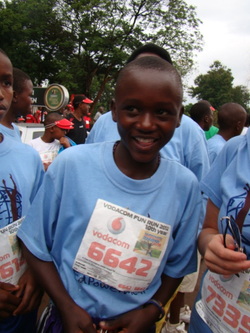 Finding a home and help for a new orphan Another all to common experience in Tanzania happened this week when a grandmother died and left her 5 grandchildren scrambling for a new home. One of our past Kilimahewa students- Humphrey- attended Kilimahewa last year but then was forced to move away for a year to live in another city with his aunt. He recently returned for the January school year because his aunt could not take care of him. This student came back to live with his 85 year old grandmother and his 4 cousins in a small house close to Kilimahewa Educational Center. When Humphrey returned to Kilimahewa in January Jillian and I met his grandmother and talked to her about her situation and started looking for ways to help support her and Humphrey. We started by enrolling him at Kilimahewa and purchasing school supplies and a uniform for him. We scheduled a meeting to see his grandmother at her house and meet his cousins when a week later when his grandmother of 85 years died and left all 5 kids without a caregiver. This grandmother lost all three of her own children for different reasons and was working to raise her grand kids with a small farm she owned. Food was scare, money was non-existent, and the kids worked hard to survive. The loss of this grandmother really left these kids with few places to turn. We really wanted to help out Humphrey but could not find a school that could take him due to his low tests scores from primary school. As a result the villagers and the family's tribe came up with a plan for one of the woman to stay in the house with him and take care of the kids. We are going to support the family with small amounts of money for food and necessities for the kids. We decided that Humphrey will attend Kilimahewa for one year and then we will see if a school will allow him to sit their entrance exams and accept him for the 2013 school year. It is not the best plan but in a country with full orphanages, a struggling school system, and very little social welfare it was the best we could come up with. 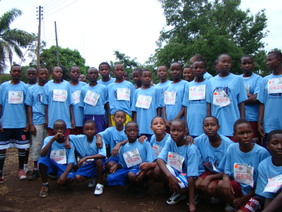 The Kilimanjaro Marathon This week was also the week for the Kilimanjaro Marathon, one of the biggest events that occurs in Moshi every February. This event is sponsored by Wild Frontiers Safari Company, Kilimanjaro Breweries, and VodaCom Network. Every year these companies host a Full Marathon, Half Marathon, and a 5K Fun Run. We decided that this would be a good way for the kids of Kilimahewa to participate in something within their community and help them be apart of something larger than their small village. We had 37 students that signed up to run in the race and 5 adults. We spent part of the week organizing t-shirts, finding dala dala (buses) to drive them, and trying to register the kids. In typical Tanzanian fashion registration for a large event that brings in people from all over the world started only two days before the race in a small hotel lobby. When we showed up to pick up the registration forms the foreign volunteer that had flown to Tanzania only to help with the race told us that next year we should have all the kids and their parents register online. The response I wanted to say was….ok next time we will take them to the school computer lab and have the register with the help of the technology teacher (Yes I am being sarcastic here- classes here are 80 kids to one teacher with limited textbooks- very few schools have electricity so computer labs are hard to come by). She than stated that they needed to write the addresses of their homes on the registration forms. Had this woman been in Africa for more than five minutes she would have experienced the lack of electricity and lack of computers and realized that addresses do not exist here. When you ask where someone lives they say the house at the top of the hill next to the large rock and tall acacia tree. Needless to say that address did not fit on the form. (; Either way we managed to get them all registered and everything ended up working out very well. The day of the race came and although there was a huge rain storm the night before 34 of the 37 kids showed up on time and were so excited to participate in the race. After running in the 5K the kids were able to hang out at the stadium in town with all the participants, have some peanut butter sandwiches and bananas for lunch and watch as the marathon runners entered the stadium. It was a pretty awesome experience and a great last day to the crazy week we had. Seeing the kids smiling faces helped us realize why we love it here so much. 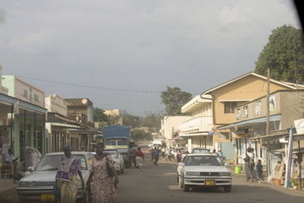 New Office Space
Last but not least we spent the week searching for some office space for our new EdPowerment Office. Our current office was located in a room within Mama Grace’s home (Our in-country director) and as we are expanding the things we are doing here we realized the need to have an office in a central location within town. So in our free time (which was not much) we spent the week viewing different office space and finally found a new place to call home. So (not that many will know where this is) we are now located in the middle of town in a place called Kibo Tower. If in Moshi, come visit us. This week we are out looking for office furnature and setting things up. Exciting stuff!! All in all an amazing week for EdPowerment and its programs. We had a great time, accomplished these and so many other things that I did not have time to comment on, and realized why we love the work we do here so much. So stay tuned for further updates on our work and other interesting and exciting things as we continue our adventure in Moshi. MIss you all! (: Coming to Tanzania has been quite an experience this year, but the most touching and rewarding has been the work we are doing with special needs organizations, families, and children.
3rd World countries often lack basic education on health, nutrition, and mental or physical illnesses. This often results in many myths and theories about why kids are born with disabilities. Many families are constantly asking why their kids are disabled. Due to the lack of education ideas exist here that kids are disabled because their parents were evil people or that their child was possessed by the devil and that is the cause of their disability. In most cases we have seen here in Tanzania families often feel ashamed, depressed, and embarrassed about their child’s disability due to the lack of general understanding and they are often craving any type of help. They yearn for any understanding of why their child is disabled, how to help their child, where to go for support, and what to do. As a special education teacher I have worked with many families of kids with a wide varieties of disabilities teaching in America, England and Tanzania. Although each country offered it’s own challenges, I have found that in the 3rd world there are very little supports (if any) and families are left with no where to go. Schools do not accept all children although there are laws requiring them too. The very few special needs classroom teachers are given absolutely no resources (not even classrooms) and very little training. Trained special needs teachers are assigned to schools and expected to build special needs programs in their first year of teaching which leads to many teachers not admitting they have special needs training. Hospitals do not always know how to deal with children of special needs and as a results families wait long hours in hospitals. This has resulted in deaths simply due to lack of services. Many kids are often diagnosed with either Downs Syndrome or Mental Retardation just because knowledge of any other disabilities is very limited. Services like occupational therapy, physical therapy, speech therapy exist but only in very small amounts and for only those that have money to pay for them. (There are only 30 OT’s in all of Tanzania) All in all, students with disabilities are not able to access education, healthcare, and services needed to help them function within the society they live and therefore end up begging on the streets, locked away in houses, or dying at very early ages. The last few weeks we have dedicated our time here to building relationships with organizations that support families with disabilities. We have been lucky enough to meet some amazing people through an organization called Building a Caring Community (BCC). This organization realized that families lacked services and worked to create a way to help provide families with some help. They have 11 centers throughout Moshi area and they employ and train mothers of children to work at the centers. This program supports about 230 children each year in this area and is one of the first programs of it’s kind that we have seen working to support families and kids. We spent the last few weeks visiting different BCC centers, working with center staff to create a common schedule and training program and creating a plan to work together to create a collection of special needs curriculum activities for 3rd world countries. This project, which will be quite large, will allow us to distribute materials and activities that people with very limited resources in very underdeveloped countries can utilize to help those in need. It is a partnership that we have been so happy to make and that has helped us finally see some possibilities for the future for these kids. Yesterday Jillian and I were invited to meet a family that had a daughter with special needs. The woman that invited us works at the post office and we see her every time we go get our packages and every time she tells us about this little girl and how she is trying to help this family. We were a bit nervous about it at first but decided to go and help this woman out anyway. So we went to her friend’s home to meet her daughter who had special needs. When we arrived we met with the family and saw their 5 ½ year old girl named Doreen. Doreen had visible physical disabilities and deformities as well as the intellectual functioning of a typical 6 month old. She is still in diapers, was non-verbal, could not move her legs and arm, struggled holding up her own head but had a smile that lit up the entire room. Doreen was one of the kids that you see that makes you instantly fall in love. As I held her and listen to her mom explain how she doesn’t know what to do, all I kept thinking is how in their one room house this child has very little options, family supports or future choices due to the fact that they live in a 3rd world country where only a handful of services exist and if a family has little funds there are no services they could even access. Although her situation was pretty bleak Doreen was following everything we were saying and had a smile that melted my heart. It was especially hard when the family asked us to take the child because they had no idea what to do. We told the family that was not an option but informed them about the different programs we knew of and that we would get some more information from those programs to help her out. We also told her we would look into finding an organization to help her get a wheelchair. As we left I felt immediately defeated, same feeling I always have when I leave a situation here where the disability is great and money is the biggest issue. Although I was feeling defeated I also felt a little bit of hope because finally after 5 months of networking and meeting people and trying to find connections we at least had somewhere to turn to for help with this child. That same evening we ran into another friend of ours from America doing work here. He offered us a ride home from town and as we were driving we told him about Doreen. Although he leaves on Monday to return to the United States he immediately started making some phone calls and talking to friends about possibly finding a wheel chair for this girl. It is another reason I love the work we do here. Even in the most dire of situations there is hope and when you are not sure where to go someone runs into you on the street with a huge heart and jumps to help you out. Whether it is the postoffice employee helping this woman and her child, the BCC centers helping the kids and their families, or our friend helping us with a wheelchair, sometimes that feeling of defeat is replaced by a feeling of hope and possibilities. It is our hope that through the connections we have worked to make and some of the plans we have for things here we and others will come to help kids like Doreen and help others to work to educate those that are often locked in their homes. Hopefully we can help the voiceless in society find a way to collectively have a voice. For more information on our autism program- Check out our newly improved Autism Connects Tanzania website: www.autismconnectstanzania.org These last two weeks were the first few weeks of the new semester at Kilimahewa. After 3 weeks off for the holidays the students returned to school on the first day looking rejuvenated and refreshed. Before the holiday break Jillian and I spent a few meetings working with the teachers to develop some policies and procedures for attendance and behavior concerns that the teachers and students expressed. We spent the first day of school going over these new policies and procedures with the kids and let the kids ask questions and make comments about what they heard. The questions and comments were the most interesting part of the first day of school for me because it reminded me that while different circumstances exist kids are kids in all parts of the world. The first few questions though were hard for us to field. Student #1: How do I get to school if my parents spend all their money drinking and I do not have money for the bus? Student #2: What do we do if our parents are too sick or drunk to come to the school or we don’t have a cell phone to use to call when we are sick? Sometimes I have moments where I am amazed by the difference in first world problems and third world problems as I was in the conversation about the drunken parents. Kilimahewa is in an area called the Samburi Ward. Most of the villagers are of the Chagga tribe and are pretty poor. A common tribal drink in this area is called Mbege. It is common in this area and is most widely known to be from this area. It is made of fermented millet, water and bananas. This drink is really cheap and is mainly made in the area of Samburi by drying millet in the sun for a day, putting it into a bucket with water and banana and letting it ferment for 2 days. Then people sit around the bucket using a cup, they pass around the drink and consume the alcohol. As a result in this area there is a bar every other building and everyone is Mbege makers or participate in someway in the creation of this brew. It also means they are often found sitting around drinking it. For the very poor and depressed families in our area they use this brew as a way to escape the realities they are face or make a profit to feed their families. For others this alcohol production and consumption is seen as a real struggle to fight poverty and overcome the problems caused by poverty. For some of the kids of Kilimahewa this drink leaves the parents spending their school fee money on alcohol or forcing them to constantly take care of their drunk parents or their abandoned siblings. In the first world alcoholism is a hidden problem people are ashamed to talk about, they might go seek out help in rehab or AA but it is not often entire neighborhoods consumed by it. In the Samburi Ward alcoholism is a way of life. Everyone makes it, everyone drinks it, everyone is affected by it. This is partly why we are drawn to this area to help the kids find new ways out of this cycle by gaining education but it still makes it hard to answer the kids when they ask what to do about their alcohol affected home lives. After a short discussion about talking to the Kilimahewa teachers about that individually when it happens we then had a question about something I had fielded before I came to Tanzania. Student #3: Can we bring cell phones to school? There are other times where I am amazed at the similarities between the first and the third world. Before I left America our school was discussing a new cell phone policy. Committees were developed to determine new rules around how kids could use their cell phones in and outside of class. Students, parents, and teachers were asked their input and many kids in class commented on how they should be able to have phones with various lists of reasons. Now, students at Antioch High School can carry their cell phones and some teachers are even incorporating them into their daily lessons. Here in Tanzania the cell phone is the one object most people have. They may only have one pair of shoes or one nice outfit but you can guarantee someone or everyone in the house has a cell phone, and that phone is taken with them everywhere. It is usually their only link to the outside world and often it seems like it attached to people’s heads. In my experiences in 3rd world countries it is often technology that surpasses urban development. As Tanzania was starting to lay the phone lines to have land line telephones the cell phone was developed so there was no need. As they started to develop internet cafes to open up people to the outside world, wireless was created and smart phones started to be introduced. Just as the 3rd world starts to organize some basic “needed” development new technology stops everything because the need no longer exists. Many people in Tanzania have never seen a house phone or do they know anyone who has one, but they all have cell phones. In our meeting on the first day of school, amoungst the poverty and after the conversation about alcoholism I found myself listening to the same questions and comments about cell phones that were raised by some of my students in America. Students stated their need to have cell phones and their reasoning behind why they should be allowed to bring them to school. If I closed my eyes and wasn’t translating the language in my head I would have thought I was in America. It is times like this I remember where every you go in the world sometimes we are all just people and kids are just kids. This is another reason why we are drawn to this area. All kids in the world deserve to be educated and deserve to have conversations like this. Granted it is just a cell phone they are concerned about but I am happy to work here knowing that the cell phone conversation means that the kids are not always worried about their drunken families and their crazy home lives. Once and a while they get to be kids. Kids excited about the new flashy objects and pushing the authority to get what they want. And for those out there who keep teasing me about my traveling alot this past month (when there was no school) here is a list of what we have done over the last two weeks, just to prove to you we really are working. :)
All in all a crazy busy productive week. It feels good to be back at school and working to help the kids of Kilimahewa. In the month of March we are going to hold our 2nd annual Edpowerment Fundraising Challenge. We are asking people to help plan fundraisers to help support the operational costs of Kilimahewa Educational Center, (which is $17,000). The costs cover the teacher salaries, food program, textbooks and supplies, and any little things that come up like helping kids with school uniforms. We will be asking for supporters to help fundraise $250 or more. The kids here will also be fundraising to help their own school by running in the Kilimanjaro 5K run at the end of February. So start putting on your thinking caps and brainstorming some fundraising ideas. Since we are in Africa, we need all the help we can get. At this time last year I was starting my first week of classes in the second semester at Antioch High School. Tomorrow I will return back to work to help kick off a new school year at Kilimahewa Educational Center in Tanzania. Same Same but very different. I cannot believe how much has happened within this last year. Doing a quick audit of my life this year here are some of the things that stand out, I..... Got divorced Sold my house and most of my things Moved home to my parents house to live in the “compound” (as my family calls it) Started a high school Rotary Group Won a National Teaching Award Finished my Educational Administration Degree Raised enough money to put up a water project at Kilimahewa Participated in leadership teams in my school and lead different teacher trainings Traveled to 9 different countries on three different continents Started a afterschool leadership group at Kilimahewa Experienced my first earthquake Learned how to surf Attended my first Muslim wedding Helped organize professional development for teachers at Kilimahewa Studied a new language Climbed Table Mountain Had my first Christmas experience away from home in hot weather All in all a great year. But as the year wrapped up I was a bit homesick and missing the comforts of my family and life in America. December is one of my favorite months at home and it was hard to not be there for all the excitement. Christmas and New Years in Africa is just not the same as it was at home. Although we had visitors from America, a construction paper Christmas tree, saxaphone playing santas in town, an amazing fruit salad breakfast, and a secret santa exchange it felt a little sad and depressing. I missed my family, dad’s breakfast, the cold weather, the 24 hour Christmas music channel, the Christmas lights and decorations, the smell of holiday candles, the crazy shopping, baileys and hot chocolate, and my family raviolis. For us Christmas eve was spent dancing at our favorite local bar until late into the night and then waking up to breakfast and movie watching. Not a bad day, just not the same. We did spend the afternoon of Christmas day swimming at a local pool and relaxing but I missed my family. Skype just doesn’t completely quench the thirst of not being together for Christmas. So for New Years Jillian and I embarked on an adventure with some of our friends that were visiting and went on a trip to the Island of Zanzibar. Zanzibar is an island of the coast of Tanzania. It is part of the country but has a bit of a different culture. Most of the people are Muslim and live a very island lifestyle. It also was a stop on the trade routes from India and as a result is full of spice fields that are grown and exported to mainland Tanzania and around the globe. The largest crop that is exported is the clove plant but they have vanilla, cinnamon, exotic fruits, lemongrass, cardamon, and many more. We spent 4 amazing days soaking up sun on the beautiful blue beaches, exploring the spice fields, practicing our swahili, eating some amazing seafood and learning about the history of Zanzibar in Stone Town. It was a great way to kick off 2012 and being with Mike and Mirielle (good friends of ours from Chicago) made it a great trip. Before we left for Zanzibar I was reading my favorite blog, “The Art of Nonconformity” by Chris Guillebeau and he posed a question to readers, “What is your personal theme for the 2011?” This made me think intensely about the year I have had and the crazy changes and adventures I have been able to experience. Through my travels often my students will send me emails and ask me what I am doing or where I am going next. They will tell me that I am inspiring them or changing the world. I am definitely not changing the big bad world that much and I although I am happy I inspire people I am here because I truely think that helping others allows you to help yourself. So My answer Chris is this: One should always find ways to help others while at the same time trying to make life a daring adventure. Through your humanity and the experiences that push you in ways you did not know possible you will find true happiness and new appreciation for life. There is my ounce of wisdom for you all as 2011 wraps to a close for me. Not quite the one word answer but after this crazy year that is what I have learned. I am sorry this is a short post and that I haven't written in a while but I will be back to writing weekly posts this month and entertaining you with my crazy experiences.So you might be asking what’s happening in 2012…. You will have to stay tuned to find out. (: (If I told you what was coming next you wouldn't keep coming back for more) Anyway here is a few of my favorite pictures from 2011...... 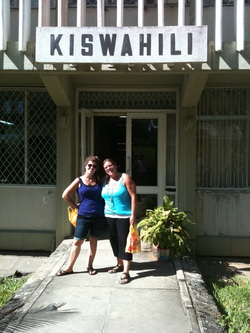 After returning from South Africa Jillian and I have taken up residence in Dar es Salaam with our friend Mussa’s cousin Shomary and his family. Dar es Salaam is the largest city in Tanzania and is often considered the economic and social center of Tanzania. It is located on the coast and is often a place tourist only visit to transit between their home country and Zanzibar or Kilimanjaro Airports. As a result there are not as many wazungus (foreigners) in Dar as in our home base of Moshi. It is the place were most countries set up their embassies so there is a large ex-pat population but in our experience that population seems to keep to them selves and do not seem to mix to much with the common population. Jillian and I have been here for 2 ½ weeks studying Swahili at the Kiswahili Institute. We really want to learn the language and knew that the only way to do so was to take a class and bury ourselves in an area where we could focus solely on learning the language. 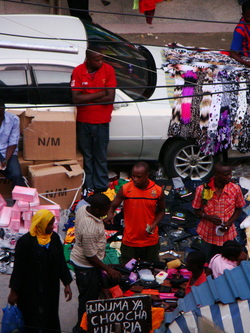 A street near our house. Even the streets and cars become clothing stalls. Shomary and his family live in an area of Dar called Kariakoo. If Dar es Salaam is the brain of Tanzania then Kariakoo is the Medulla Oblongata. Kariakoo is an area of Dar that was originally the area that black Africans were forced to live during colonization times. It is also the area where the first president would meet with other leaders to plan the countries independence. As a result you will rarely see a wazungu (foreigner) in this area unless they are there taking pictures. It is a crazy area of town full of a huge market where everyone from the country comes to get cheap products to take back to their shops/towns to sell for a higher price. There are people everywhere, shops in every square inch, and streets filled with cars, motorbikes, carts, people, and tons of things to be sold. All public bus routes start and end in this area and people are everywhere. You can hear people selling things at all hours of the night and not a day goes by that it doesn’t feel like you have entered into a place where everything functions without an rules, organization or order. 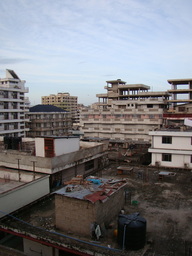 The view outside of Shomary's house. Honestly the first time I came here I was scared to death and the first day Jillian and I were here without Mussa and Adam we didn’t leave the house alone because of how crazy it is. We soon realized that if we didn’t figure it out and get over our crazy fear we would be prisoners in our home. So we took to the streets and started exploring and now have realized how much we love Dar and love Kariakoo. Living here has been pretty amazing for the following reasons: 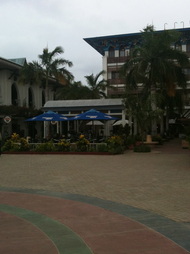 Slipway: the place we studied everyday. 1) It has forced us to learn Swahili at a very quick pace. In Moshi so many people speak English due to the large tourist industry that we are not forced to use our Swahili. Here in Dar our class has been really good and we have spent every possible hour studying Kiswahili and working to learn as much as we can. Also in Kariakoo many people assume if you are there you speak Swahili and will not talk to you in English even if they know it. We have to ride the public bus every day for an hour to our class, walk through the major market and live with a family where most people only speak Swahili. These things have forced us to use and speak Swahili more and more everyday. 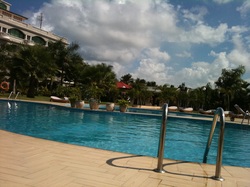 The Hilton we snuck into. What a lovely place to relax. (: 2) Being in a city has been amazing because there is so much to do and we have been able to have a lot of fun. We have been able to go to the movie theater and see the new Twilight movie. We spend every day next to the Indian Ocean and have spent days and nights hanging out at the beach studying and talking with new friends. We snuck into a beautiful Hilton hotel and pretended we were staying there so we could use the beautiful pool and go swimming. We have been able to visit different restaurants and try different Tanzanian foods. We were able to go to a huge city dance clubs with some new friends and we have met so many different people and new friends who push us to speak Swahili. 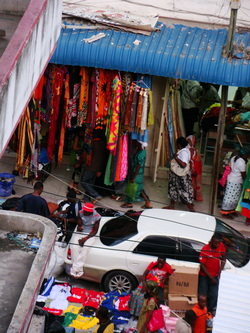 The Urban Life in Africa 3) We have been able to have some crazy hilarious African experiences in a more urban setting. We sat in a traffic jam for 2 hours as a man tried to sell a coat rack to cars stuck in the 100 degree heat. We bargained hard with bajaji (tuktuk) drivers in swhaili slang about getting a ride across town for less than $3, when the bajaji driver said, you girls are not wazungus implying we were locals. We went to the new mall to get dinner and go to a movie and were told at one restaurant that the only food they had left was chips (fries). We then went into Subway and were told they had no bread. As a result we ended up eating chai (tea) and mandazi (bread) for dinner. Then we went to the movie and were told that despite the advertisements the movie we wanted to see was not playing. Another one, Walking through the streets of crazy Kariakoo listening to the Christmas song “Let it Snow” in 100 degree heat. 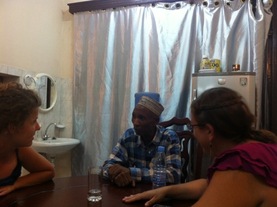 Us conversing with Mr. Who who told us he would be willing to relocate to Moshi 4) We have also loved spending time with Shomary’s family and becoming a small part of the family. We are living with Shomary and his daughter, Layla, his niece, his nephew, and a dada (housekeeper) who helps with the kids. The kids have brought a different spin to life for us and it has been a lot of fun. We spend time with his brother Amery translating the newspaper and learning Swahili slang every day at the family shop. We have a father figure in Mr. Who, a friend of Shomary who visits and tells us stories in Swahili. We have made friends with many of Shomary friends who think we are crazy wazungu’s and we have a group of people who take care of us and worry about us when we show up a bit later than we had planned. It has been really nice to have people here who we now know and have connections with in the mix of the craziness of Kariakoo. 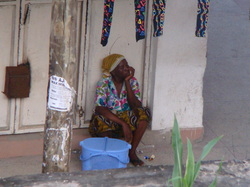 5) Another plus is being in a place where there are thousands of people but no one bothers you or gives you a hard time. Imagine being a white person in your American clothes walking through a crazy African city market in 100 degree heat in the middle of a neighborhood with thousands of people none of which are white walk all around you, with market stalls everywhere, people selling fruit and shoes and clothes on a tarp on the street while buses drive by their feet, with carts, motorbikes, bicycles swerving around it all. You stand out like a florescent neon light but people rarely bother you. It is hard to believe but at home in Moshi, in a town of less than a million, people are constantly harassing you and asking you to buy something or be their girlfriends or talk to them. While in Dar a city of 5 million people we are barely bothered and people are too busy to pay us any attention. As we learn more Swahili we hear them making comments sometimes but generally we can get through the day unnoticed. 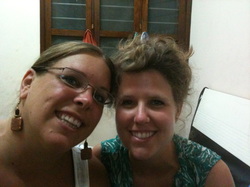 All in all, we have had a great time here and we have really loved being here. We head back to Moshi this Sunday and are sad to go. We are happy to being heading home to our house, our roommates and our friends but we have loved city life and will definitely miss it. We are already making plans to come back and the dada (housekeeper) at Showmary’s is telling us she won’t let us leave. Shomary is using our doubt about our complete understanding of swahili to convince us we need to stay for a few more weeks and the kids keep telling us they are going to hide our stuff so we cannot go. We also have developed a huge amount of knowledge about Swahili and although not at all fluent are much better than we were before. We are understanding much more, writing and reading Swahili, listening to the radio and watching Swahili television. We don’t understand everything and sometimes we make small and large mistakes but it was worth the trip. I just hope to impress all my friends in Moshi with my use of it. To show you my skills here is paragraph in Swahili about my day today and it shows our typical day here…If you can read Swahili let me know if I did a good job (keep in mind I have only studied for two weeks). If you cannot read it- try google translator….. Leo niliamka saa kumi na mbili unusu halafu nilioga na nilivaa na nilipiga mswaki. Chakula kilipigwa na dada na nilikula mayai, mkate, na chai. Bada ya chakula Jillian na mimi tuliondoka kuwenda schule. Kuwenda schule tulihitaji kupanda basi kwa sababu tukipanda taxi tungehitaji kulipa bei ni gali. Basi liliposimama tuliondoka na tulienda dereva na bajaji. Tulizungumza kwa dereva kuhusu bei kutuandesha schule. Tulisema, “Tunataka kuwenda slipway. Shin gapi? Tulilipa elfu moja kila siku. Tunalipa elfu moja tu.” Bada ya tulisema dereva na bajaji alisema, “ndiyo, twendeni.” Tulipofika Slipway, tuko schule. Tulisoma Kiwsahili kwa mwanafunzi mwingine anatoka Germany na mwalimu. Somo huanza saa mbili. Saa nne somo huacha kwa hiyo wanafunzi huenda duka na cahawa. Sisi hukunywa cahawa na chai masala halafu hurudi dasara. Husoma ziadi. Saa Sita mchana somo kwisha. Jillian na Mimi tulikula matunda na biscoti halafu tulisoma wenyewe. Tungetaka kuja baharini halafu tungekuja. Husoma mchana kila siku lakini tulisoma mahaili tofauti kila siku. Hurudi Kariakoo saa kumi na mbili jioni. Mara Mwingine tulienda DDC Social Club kunywa pomba na kuzumgumza kwa wajiini. Kabla ya kwamba tulitembelea dukani na Shomary na tulizugumza kwa rafikis wetu. Hurudi nyumbani saa moja unusu jioni. Chakula kilipigwa na dada tena. Familia ya Shomary walikaa mezini kula chakula. Hukaa kwa familia na kuongea kuhusu siku yetu. Hulienda kulala saa sita jioni. Halafu tulilala la fofo. This week will be spent preparing for the holiday season. Many of our programs here are on hold because of the holidays and we have friends arriving to visit from Chicago so most of our time this week will be preparing for them to arrive and putting up Christmas decorations. For Christmas we plan to have a party on Christmas Eve with all our friends here and then have a nice breakfast on Christmas Day with our roommates. We plan to do a secret santa gift exchange and then spend the afternoon at the pool swimming and enjoying the sun. We are happy to be home but miss our new friends in Dar. I hope everyone at home is doing well. Keep me in your thoughts this holiday season as you are definitely always in mine.
Miss you! This past few weeks was the week of my birthday, Thanksgiving, and an amazing trip to South Africa. Since making yearly journeys to Tanzania Jillian and I have not had the opportunity to go any where in Africa other than the cities of Tanzania. When we heard that Precision Air lines was offering a cheap flight to South Africa we decided to book a trip to Cape Town to experience something new. Our friends Adam and Mussa also agreed to go with us and we booked our flight two days after my birthday. 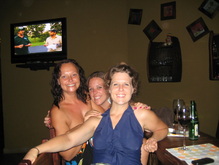 Since I was going to be in Moshi for my birthday the lovely ladies that I am friends with, Michelle and Jillian, organized a get together at a nice river lodge that had a pool. We spent the day swimming by the pool with Swaleh and then were joined by a group of friends for drinks. The day was amazing and perfect and we had so much fun. 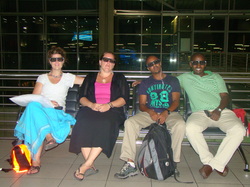 The next morning Adam, Mussa, Jillian and I got on our bus to make the 10-hour trek to Dar es Salaam to catch our flight to South Africa. We arrived in Dar in the evening and had dinner with Mussa’s cousin, Showmi. We had a nice meal of chicken and goat BBQ and then went to the cinema in Dar to see a 3-D movie called Shark Night. This was probably not the best choice considering we were going to a city full of beautiful beaches with boys who were already scared of swimming in the ocean, but we thought the idea of a 3-D movie sounded cool. The next day we toured around Dar until we left for the airport to catch our flight to South Africa. 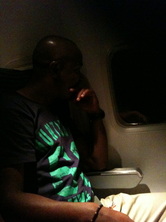 Our first flight was 3 ½ hours to Johannesburg. The flight was very nice and it was a lot of fun to see Mussa and Adam on their first international flight. Once landing in Jo-Berg we had to spend the night at the airport. The airport was decorated with Christmas decorations, which was weird for us since it feels so much like summer here. The airport was also huge and very modern, which is not what we expect when we think of Africa. We spent an hour walking around looking at the different shops and restaurants as well as playing on the escalators and elevators. We found some nice benches by our next airline check-in counter and tried to get some sleep. Mussa had read that the Johannesburg airport was not the safest place so he stayed up and kept watch over us all night. 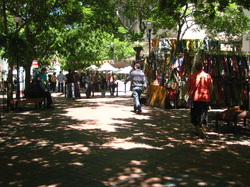 We made it through the night with no problems and in the morning we boarded our plane to Cape Town. The flight was 2 ½ hours and we slept most of the way. When we arrived in Cape Town and left the airport it felt as if we had entered Europe. The guys kept saying, “This is not Africa, We are not in Africa”. Everywhere we looked were organized streets, fancy cars, shops and restaurants. It felt like we were at home in America. Our airport shuttle dropped us off at the hostel we were staying and we dropped our stuff and went to explore Cape Town. Our first stop was a coffee shop to have breakfast. Jill and I were so excited because they had food we would find at home but the guys were a bit lost in what to order. They were not in Tanzania anymore and even things like Tea were different and required some explanation. In Tanzania most tea is made with Milk not water, in SA tea was English Breakfast Tea and was a bit different. After breakfast we headed to the main shopping area and walked around the department stores. This was a bit overwhelming all of us, but mostly for the guys who had never seen so many clothes in such a large space. In one department store we decided we had to leave because it was even overwhelming for Jillian and I, and the guys were just standing around looking lost and confused. We then made reservations at a restaurant called Mama Africa that served game meat. We had an amazing dinner of ostrich, crocodile, impala, and kudu. It was a good day full of lots of experiences that were new for Adam and Mussa and felt more like home for Jill and I. It was also the first time we were able to show the guys what it is like in America without actually going there. 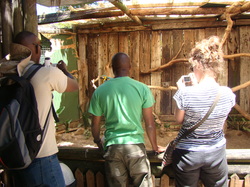 Day 2 was spent taking a bus along the beautiful coastline to the World Of Birds, the largest bird sanctuary in Africa. We spent the day looking around at all the different birds and then headed back to town. After our bus ride we spotted a store called ShopRite. This is similar to Wal-Mart or Target. Mussa and Adam wandered around the store looking at all of the things and seeing how cheap they were. They immediately started thinking about what they should buy to bring home to friends and family or to sell in TZ for a profit. Jillian and I were so excited to finally find shampoo and conditioner for our hair that was cheap and similar to home. We wandered around and bought hygiene products, Adam bought a knife to use for safari, and Mussa bought a hose. The running joke for the week was, who goes to South Africa and buys a hose? All in all it was the first time we had such cheap access to so many things we were in need of at home that our souvenirs where not your typical purchases. 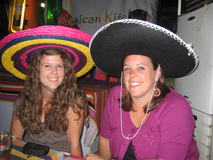 That night for dinner we ate at a Mexican Restaurant. Jill and I were so excited to eat tacos and burritos and introduce the guys to some of our favorite foods. They were happy to try them and even enjoyed what they were eating. The restaurant even let us wear sombreros. It was a fun night. One of the best things about Cape Town was the fact that we were able to eat different food every night and not have to live on beans and rice. 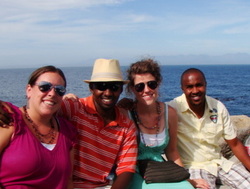 Day 3 we rented a car and drove the beautiful coast of South Africa to the Cape of Good Hope. This was one of my favorite days. The drive along the coast reminded me of the pacific coast highway in Northern California and was absolutely beautiful. There were cute small villages along the way where we were able to explore and see penguins. When we arrived to the Cape of Good Hope it was a large national park that was vast and beautiful. There we baboons, ostrich, cool plants, and tons of birds. We stopped to take pictures along the beaches and looked out to see if we could see Antarctica. (: 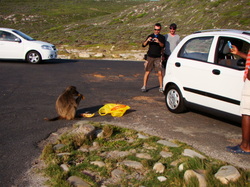 At one of our stops a door was left open in the car and a man came over and asked us if it was our car. When we told him yes he told us there was a baboon inside the car. We rushed over and found the baboon going through our things. Mussa was able to shoo him out of the car and he left with all of our snacks that we had brought. The baboon then sat in front of the car eating all our bananas and cookies confident that we could not harm him. A funny experience for sure. After we left the national park we drove back and stopped at a small town for dinner. We had a nice seafood dinner along the waterfront in front of the yacht club. We each had some good seafood and some fun conversation. A perfect day! 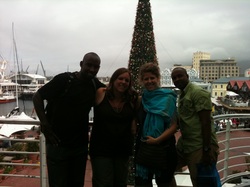 Day 4 we woke up to rain and cold weather. Since we could not do anything outside we went to the V&A Waterfront to explore the shopping mall and restaurants along the wharf. Once again the vast number of electronic stores, clothing stores, and food places amazed the guys and made Jillian and I feel like we were in America. It was a very surreal experience to walk around seeing similar stores to home and know you are in Africa. We then did what people do during rainy days; we found a pub and had some beers while watching a soccer match then went to see a movie. 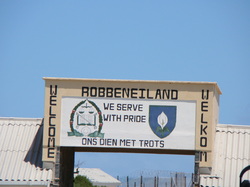 Day 5 was our dose of history. We booked a tour to Robben Island. Robben Island is an island 12 km away from Cape Town by boat and was used as a prison colony for political prisoners during the South African apartheid. In South Africa since colonialism an apartheid system was put in place that separated black and white people. Blacks were forced to live outside of cities in small poverty stricken areas called townships and forced to carry passbooks wherever they went. Those that fought against this system or lead protests against this system were arrested and sent to Robben Island. Robben Island was not your typical prison because it was filled with smart educated leaders of the anti-apartheid movement. The most famous of these leaders was Nelson Mandela. Nelson Mandela was imprisoned at Robben Island for 17 years. Much of his adult life was spent in prison and he was locked up in various places for a total of 27 years. After his release in 1994 he helped to end the Apartheid and became the President of South Africa. Our tour consisted of a boat ride across the ocean, a 45-minute bus ride around the island to see the places the prisoners worked, and a tour or the prison from an ex-prisoner. It was pretty amazing to visit a place where one of the most influential leaders of modern history spent most of his time and to know that his time there did not impact his spirit but instead made him stronger. The place gave me chills walking around it and gave me hope that even hard times cannot break the human spirit. 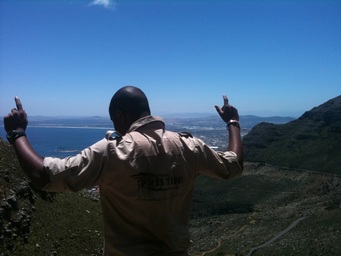 Day 6 was another great day. This day was spent climbing Table Mountain. Table Mountain is a mountain in Cape Town that rises above the city and is flat at the top like a table. The top of the mountain stretches for 3 km and the climb up is about 2 ½ hours straight up a various set of steps. The mountain is also in the running to be named one of the new 7 wonders of the world. Mussa and Adam are mountain guides in Tanzania and take people up and down Kilimanjaro all the time and Jillian is in pretty decent shape so I knew they would be fine. I, on the other hand, was very worried that I would not make it or that I would be such a hindrance to their experience. When we first started the boys wanted to me to go up first and set the pace. I was very nervous that everyone behind me wanted to go faster so I started climbing really quickly. Immediately Adam jumped in front of me and slowed me down and showed me how to climb slowly so we can make it to the top. Climbing the mountain was an amazing experience. The guys made it so much fun singing and dancing and telling jokes all the way up and when I started to struggle they held my hand and helped me up. When we stopped to take pictures the views were amazing and when we got to the top I felt like I had conquered something incredible. Even though it wasn’t a high mountain 2 ½ hours of a stair master workout made me feel elated to make it to the top. At the top we were able to see amazing views of the city and had a beautiful lunch at the restaurant at the top. Table Mountain Park also offers a 4-minute cable car ride up and down the mountain so we decided that after the 2-½ hour hike up we would take the 4-minute cable car down. (: After our amazing experience we went back to our hostel and all slept for 2 hours to recover. It was a great day. 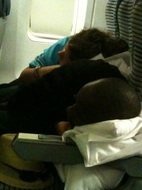 Day 7 was our departure day. We headed to the airport and hopped on our flight back to Johannesburg. On the flight there was a bad storm and our flight had to be diverted to another airport. Luckily we had a long layover so after the storm passed we were able to fly to Johannesburg and hop on our flight back to Dar. We arrived at Dar and 4 am to the extreme heat of tropical Africa and all of us immediately missed Cape Town. 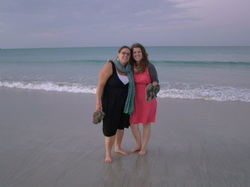 The next day was Thanksgiving and Jill and I knew that it was going to be a hard day missing our families. It was also the last day we would see Mussa and Adam for a few weeks because we were going to be staying in Dar and they were headed back to Moshi. We decided to spend the day at the beach and had a lovely lunch and swim session at one of the beautiful beaches in Dar. It was a great day even though we were not able to eat turkey and apple pie.
All in all an amazing experience and one I will never forget. 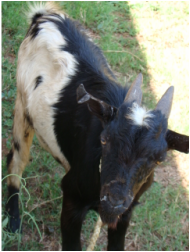 This past weekend I experienced my first EID celebration. EID is a religious holiday for Muslims that was celebrate this past weekend. It also happened to be Mussa’s (one of roommates) birthday. To celebrate the two events Mussa came up with the idea to BBQ a goat. Jillian and I thought a BBQ would be a great idea but did not actually realize what we signed up for. At 8am on Saturday Mussa pulled up in his car with a live goat and a BBQ for us to roast the goat on. The goat was tethered in the backyard until our friends Adam, Swaleh and Hussien were ready to kill and skin it for eating. Being a person who already does not eat much meat, even though I knew this was what was going to happy it was a bit difficult to all take in. 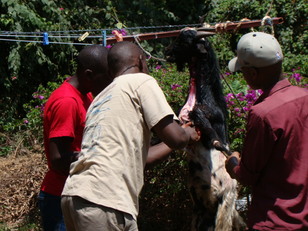 For this big event Swaleh constructed a special knife to kill the goat with. He made this when visiting his family for us to use to kill the goat.. When it was time for the guys to kill the goat they went to the backyard, laid it in the grass and held it down. I thought I would be able to watch but soon as our very calm wonderful friend Adam picked up the knife to cut the goats throat I knew I needed to close my eyes. The boys killed the goat by slitting it’s throat and then they hung it on a metal pole we have in the backyard. As it bled out, they then proceeded to skin the goat, chop up the pieces, and then give it to Tony, another roommate of ours. It was Tony’s job to then prepare the meat and cook the goat. In Tanzania there are butchers you can get meat from but it is often not refrigerated and can have many flies all over it. As a result we do not eat much meat here. Many people here in Africa have killed and skinned all forms of animals that people eat for meat because it is the freshest way to get meat here. There is no grocery store with packages of meat with expiration dates to be bought so to them they thought it was hilarious that we were so squeamish at the thought of killing and skinning this animal. 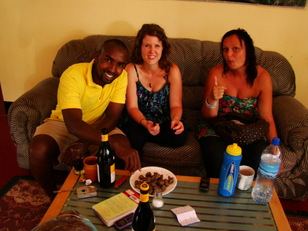 After the killing of the goat it came time for the eating of the goat. The first course that Tony and the boys made was to cook up the kidneys, liver and heart. They chopped them up in small pieces and fried them in the frying pan, similar to how you would make taco meat. The items were then put on a plate for everyone to share. I tried one piece but I was still having a hard time from the slaughterhouse that happened in our backyard that I could not really eat much more. After that round the next course was intestine soup. After seeing all the intestines of an animal in a bucket on our porch this was something that I could not bring myself to eat. For the main meal Tony prepared a goat meat pilau that was amazing and kebabs of goat meat and vegetables that were delicious. We also had chipati, rice and veggie sauce, salad, watermelon, oranges, bananas, and a delicious chocolate cake for Mussa’s birthday. The food was amazing. About twenty people came over to help us eat it and celebrate and we had a great time. 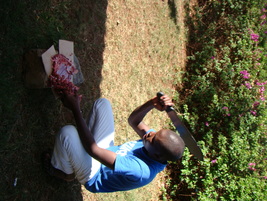 In the morning Swaleh took the head of the animal and made goat soup. Another food that I was not interested in trying but it was interesting to watch. The guys in our house enjoyed that for lunch while Jill and I ate some of our granola bars and trail mix sent by my parents. 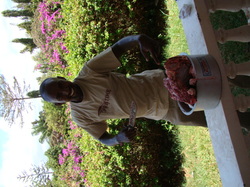 All in all watching my good friend Adam skinning a goat, my roommate Swaleh chopping up the pieces of the goat, my roommate Tony separating the meat for cooking, and then the goat head sitting on our counter will definitely be an experience I will never forget. As gross as the whole thing sounds to those living at home, it was a pretty special day here for us. A day where we remembered we live in a 3rd world country where crazy things like this are normal and a day we spent with friends who are like our family away from home. 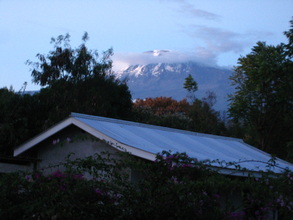 This week I read a blog entry from a friend who stated, “Every day you might find yourself in strange and random places of your own. When it happens, I hope you'll pause for a moment and think about how unusual it all is, and how beautiful it can be if you remember to appreciate it.” There could be no truer words for our experience this weekend. 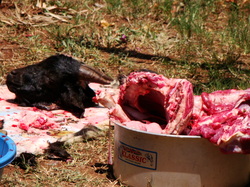 I hope you are all doing well at home. Next time you are in the meat isle in the grocery store think of us here in Africa and how the Styrofoam containers and plastic wrap covering your meat isn’t always available. Some times you need a specially made knife, three strong guys, a machete and a large BBQ to have a dinner with meat in it. (: Love you all -K This is your new blog post. Click here and start typing, or drag in elements from the top bar.
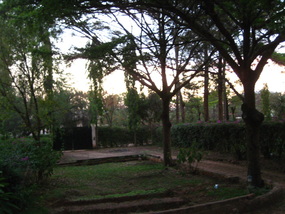 This ones a long one---but a good one (: Many people have been asking me through email or in Skype what it is like to live in Tanzania. I have been coming back and forth to this part of the world for the last few years that I forget that I may not have actually ever thoroughly explained this to some people. So this blog is dedicated to a glimpse of what life is like in Tanzania and some of the things we encounter on a regular day here. 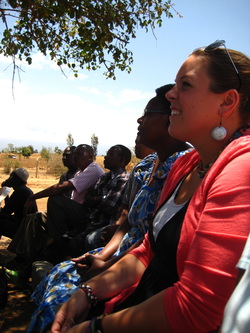 Cultural Differences One of the biggest difficulties we face here is the difference in culture that plays into every thing we do. These differences sometimes cause extreme frustrations and other times open up our eyes to a different way of life. The biggest struggle for me has been the communication differences. Americans tend to communicate in a way that tells the listener more information than they often need to know, focuses mainly on getting their own message across and often includes their feelings on things. Tanzanians tend to tell as little information as possible, always try to please speaker by rarely worrying about their view on things and listening, and never talk about their feelings directly. This can often be stressful and lead to many miscommunications between the two groups but it also has taught me to focus less on what I want to say but more on the other person. Another cultural difference is that Americans tend to create goals and make plans. They tend to worry about things like money, especially if you are living on $5000 for an entire year. Where Tanzanians tend to focus on one day at a time. They often do not budget or plan for things. This can be very difficult when living in a house with both groups but it has taught all of us to meet in the middle and find ways to see each other’s point of view. Another big cultural difference is the level of work that occurs. People often say that Americans live to work and will work until they die. This is often seen in the fact that most Americans only get 10 days off a week and work ridiculous hours. Tanzanians do not worry so much about work but instead focus on relationships and interactions with each other. For someone like myself who is used to having every minute of the day and the weekend booked with work or things to be working on it has been hard to get used to the slowed down pace of life but it is teaching me there is more to life than working so hard. Throughout my trips here and my interactions with people there are many more differences that I can talk about. Every encounter that is frustrating I have to think to myself- this could be a cultural difference and I have to find a way to learn from it. 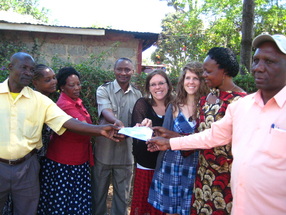 Language Barriers Another thing I deal with in Tanzania is the language barrier. The main language in Tanzania is Swahili. While there are large numbers of people that speak English, in the villages we work and in most events, meetings, and daily interactions we have are communicated in Swahili. Majority of the friends we have here speak English often but when they do speak Swahili it is often a combination of formal Swahili and Swahili slang. This has made trying to learn the language very hard. When people speak Swahili they often speak so fast that it is hard to hear the individual words, which also makes it hard to learn. While I have picked up more Swahili than I have had in the past I still speak like a 1st grader. We live with three Tanzanian’s who speak Swahili to us but I still really struggle. Jillian on the other had is doing pretty well picking up the language. This sometimes makes it hard for me because people will try to speak to me and then immediately turn to her and speak, leaving me lost. Often times I get by with my limited vocabulary and my swanglish. The first few weeks I really tried hard to learn it. I read my Swahili book, made flashcards, wrote in my notebook, and tried really hard to listen to every word said to me, but after about week 4, frustration set in and I started to give up. One of the major things I want to accomplish this year is learning Swahili. To do that Jillian and I are going to go to a two-week course in Dar Es Salaam (the largest city in TZ) and then we hope to get a language tutor when we return so I am hoping I will learn more there. 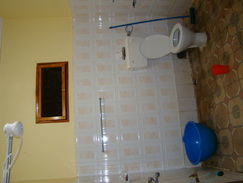 Domestic Complications A few blog posts ago I told you about the house we moved into. It is a great house and a great place to live but just like anywhere we have some issues with the house we need to work out and it leads to some hilarious and interesting events. For example we are having major water problems in our bathroom. At home you would look up a plumber online, call them, and get your water fixed or you would call your landlord. Here you are left to try to find a fundi (repair man) that knows about plumbing. Where you find that man is through word of mouth or through your friends. You have to negotiate a price, watch the man work, question what he does, and then call him back when it breaks again. After our first fundi visit Jillian and I woke up at 2am to water rushing into the bedroom from the bathroom shooting out of the pipe the fundi just fixed for $20. The room filled with water and water was shooting around the bathroom. It was quite a hilarious site and one we still laugh at to this day. After his return to the house he fixed our bathroom but than two weeks later our kitchen sink started shooting out water and flooded the house again. So water has been a constant issue. Luckily for us all Tanzanian houses tend to have cement floors that have been painted so water is not as much of a problem as it would be at home. 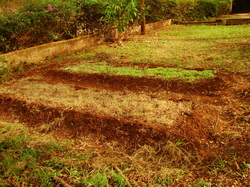 Another example of a domestic complication is that our roommate Swaleh worked to plant a garden to grown some vegetables. We had to purchase a hoe, slasher, and machete for him to create the garden. His garden creation looks like a graveyard full of freshly dug graves (just an African way of growing things- and it is working well) Instead of a hose to water the garden Swaleh then made a watering can out of a water bottle by poking holes in the bottom. It was a very inventive solution to our lack of a hose. Every morning Jill and I walk out on our front porch chatting and a lovely rooster is trying to eat our garden. The first time we saw this Jillian tried to chase the rooster out of the yard. The rooster ran for a short while and then turned around and started chasing Jill. Now every morning the rooster sits in our garden and flaps his wings at us and challenged us to chase him. I am not sure how our garden will do with this crazy rooster trying to take it over but we will see. 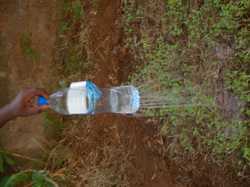 Another domestic complication is the wild animals that live in our house. This week we have found a tarantula, a huge lizard, crazy numbers of huge flying ants, a small Nairobi fly that landed on Jillian and burned her arm with it’s poison, our crazy rooster, and two birds who tried to take up residence in our kitchen. We have had so many animal encounters this week that Jillian’s dad told us that we could cage all our animals and used them to decorate for our Halloween party. Let’s just say life here is always an interesting experience. (: 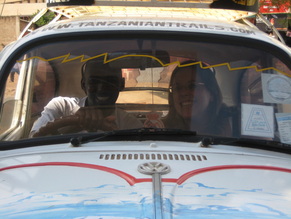 Frustrations & Fantastic Many of the westerners I know here have very similar feelings about living here. They go back and forth between loving every minute of the fabulous life that we live here and the frustrations when they miss parts of their life back home. Sometimes things here can be so challenging going between the slow pace of life that it makes you feel like you are never going to accomplish anything, to the extreme excitement you feel when you have achieved a goal. For Example: The frustration of the Immigration Office here asking you for $300 extra dollars in corruption charges on top of the $550 you already have to pay for your residency permit can then be trumped by the fantastic feeling of using your contacts to find the right person who will help you meet another contact who will help you with your paperwork without the extra fees. The frustration of going to the market and being told the prices are double because you are a “Mzungu” (white person) met with the fantastic feeling that comes after you have used your limited Swahili and knowledge of what food prices should be to bargain down and not get ripped off. The frustration of walking in the hot sun on the dirt roads to town while you really miss your car at home met by the fantastic feeling of meeting your good friends on the road who offer you rides as soon as they see you. 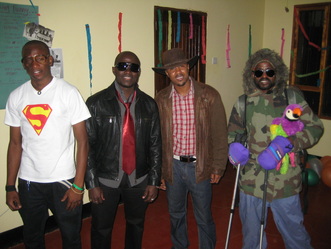 The power problems that have plagued your days with little to no electricity met by long nights sitting under the stars on your front porch with your fabulous friends in the candle light. There are so many things here that can lead to frustration such as the 3 hours it takes to do a load of laundry to then have the neighbor burn his garbage next to your laundry line so you have to wash everything again. Then there are things that lead to the fabulous feeling like when you are sitting at a café working on work and someone comes up to you and asks you about your project. That encounter than leads you meeting a great set of new friends that also are working on similar things and you feel like you are not on your own. The frustration of missing the autumn season back home and getting home sick when you see pictures of jack-o-lanterns and Halloween costumes is washed away when you construct Halloween decorations out of cardboard, plastic bags and newspaper and all your Tanzanian friends (who you have had to explain this silly holiday to in many different ways) show up in amazing costumes and you have an amazing time.  All in all living here is a balance between the incredibly frustrating and the amazingly fabulous. A Typical Day A common question I keep getting is, “what is your typical day like?” This question is a hard one to answer because anyone who has lived here can tell you every day is a new and wild adventure. But some consistency does occur throughout the day so let me try. Every morning Jill and I wake up around 7ish. We either get a ride from some friends or walk the 45 minutes to town to our favorite coffee shop Aroma Coffee. There we usually met some friends and have chai waziwa (spiced milk tea) and mandazi kuoka (bread rolls). We go there so often the woman there knows our order and is now trying to save us the Mandazi Kuoka each day because they sometimes sell out before we get there. 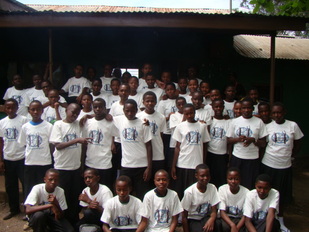 After our trip there we then often engage in a wide variety of activities depending on the day and what we are currently working on. We sometimes spend the days working on creating education materials and meeting our friend Max to help us with translations. Other times we spend the day visiting local schools to see their special needs units or meeting with village leaders to talk about the needs of the village. We sometimes attend meetings with groups we are trying to work with and visit their projects or we spend the days at Kilimahewa Education Center working with the teachers or meeting the families that surround the center. We have some days where we visit our sponsored students in their schools or we meet with local businesses to discuss the idea of funding our projects. We spend most every minute of our day trying to network with others and find others interested in joining forces or allowing us to help with special needs projects. We visit orphanages, we plan sports days for Kilimahewa, we run an afterschool group every Wed. and Thursday at Kilimaehwa, and we meet with members of the community on the water project. Every Thursday we try to attend a Rotary Club meeting and ever Sunday we try to spend some time going to Mantumani Orphanage to play with the kids. 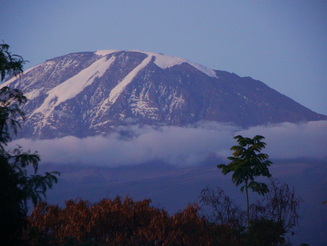 Every day changes depending on what is going on but we always usually make it home by 5pm and hang out with our roommates sitting and talking on the front or back porch. Our back porch has an amazing view of Kilimanjaro, which makes it a nice place to sit until the sunsets. We then eat dinner around 8pm. Sometimes people stop by for dinner or we will see some friends after dinner or watch a movie or TV show on our computers and go to bed by midnight. We live our lives with or without power but our evening routine sometimes changes if our power goes out. It gets boring in the dark house so we will find other things to do with friends if we have no power. We also do not have a refrigerator or an oven so we often have to buy stuff for dinner every day from the woman down the street who sells vegetables or the shop that sells eggs and shelf foods. We often do this on our walk home from town. Everyday we our able to see our closest friends either in town or during or after dinner which it easy to love this place even when you want to scream about the frustrations. There is always someone to talk to and turn to in our house and in our lives, which makes it a fun place to be. We also have many people back home we try to stay in contact with over Skype. 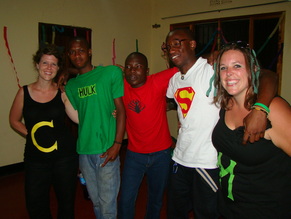 Overall, it is a pretty nice situation full of hard work and lots of fun. I hope this helps answer your question. Please feel free to comment and ask any other questions you might be interested. I would love to tell you more but I already almost wrote a novel. I hope everyone had a great Halloween!
Miss you all! (: 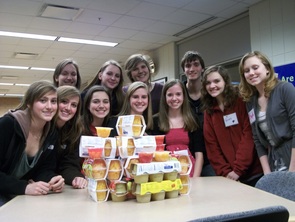 Before I left Tanzania I became pretty involved with the Antioch Rotary Club. The Antioch Rotary Club is a branch of Rotary International. Rotary International is an organization that I always wanted to be a part of and a organization I admired for its focus on service. Rotary International was founded in Chicago by a group of professionals that were looking to find a way to help their community. They met and became friends and also engaged in various service projects throughout the Chicago land area. This drive for service expanded all over the globe and now Rotary International operates in most countries on the planet and has been doing amazing things. They made it one of their goals to eradicate polio from the planet and have been successful in eliminating it from all but a few cases in a few countries today. They have funded the vaccines for polio that goes out to most of the world and have worked to make sure everyone has access to those vaccines. Within communities around the world people have come together to work focus on service through Rotary. Individual clubs pop up and the groups decide what their polio is going to be. Once they create a mission they work together to serve that mission. Most of you that know me well, know this is an organization that stands for similar values that I do. Last year I was invited to attend an Antioch Rotary auction that was held in Antioch in October. At that auction I met many people working hard to raise money to help send teenagers on international exchange programs. In a discussion with one man, Mike Schwatz, we decided to start a high school branch of Rotary together called, Interact. This is and will always be something I am most proud of doing in my teaching career. We decided that the club would combine students from both Antioch and Lakes and we held informational sessions to seek out student interest. We found another amazing person to help advise the group with us named Nancy Clutter. She was a perfect choice and had already done some amazing work in Haiti providing health care after the earthquake. Together we were able to put together a solid core group of kids that were very interested in service work and international understanding. This group of kids are still together working to improve interact while I am here but they are some of the most amazing young people I have come to know. They jumped right into starting a new club, organizing and getting chartered from Rotary International, and selecting their mission of fighting malnutrition and global hunger. Last year they were able to raise awareness at an International Night about world hunger, volunteer at the local food pantry, collect fruit cups for a backpack program, and donate funds to feed my students at Kilimahewa. In the first year Interact was doing some amazing things. This year although I am not in the US I try to keep in contact with them and I know that they will continue to do amazing things. 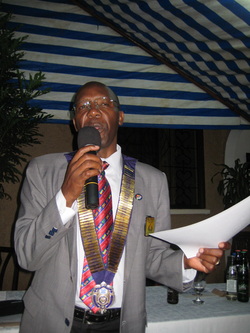 Being that this had a big impact on me and that the Antioch Rotary was kind enough to support our EdPowerment water project, I was interested in getting to know the local rotary club in Moshi. My hope was that through connecting with the local Moshi Rotary we could create some sort of cultural exchange between the US club and Interact Club and the Moshi Club. This week I was able to acquire the name and phone number of the President of the Moshi Rotary Club. I called him to see about attending a meeting this past Thursday and was told the meeting was in a few hours and Jillian and I should come. So after our amazing afterschool group at Kilimahewa we jumped in a taxi and headed to the Kilimanjaro Crane Hotel to meet the Moshi Rotary. When we arrived we met 15 Rotary members who were discussing the arrival of the Lt. Govenor of Rotary. The Lt. Govenor overseas all the Rotary clubs in Tanzania, Uganda, and Kenya. He was coming to meet the Moshi Rotary Club and all the new clubs that were created in Tanzania in the last year. In the Kilimanjaro region the Moshi Rotary Club helped to create 22 new clubs, 2 new interacts, and were working to create 2 new Rotaracts (the college level of Rotary). The meeting was very interesting and we learned that on top of creating new clubs the Moshi Rotary club had a mission of helping provide clean water, and education. Being that these were similar missions of EdPowerment Jillian and I were very happy to attend. As the meeting wrapped up the Rotary Members invited us to attend a nice dinner the next day with the Lt. Governor. We were not expecting this but were so excited at the opportunity. The next evening we met the Rotary members at the Crane Hotel again and jumped into a car with one of the members who drove us to the Presidents house in a village called Kiboroloni. When we arrive their was a tent outside the house and a beautiful area set up for dinner. About 50 people attended the dinner. There were Moshi Rotary Members, Invited Guests, and members of some of the new rotary clubs. We had an amazing meal, were able to speak to some amazing people, and hear a great inspirational speech from the Lt. Governor. He addressed the group and talked about the history of Rotary and that people need to work and live not for money and for themselves but to be able to give back and help others. He talked about all the things he was blessed with through his involvement in Rotary as well as what he has seen Rotary accomplish. Luckily for us his Swahili was not as good as his English so we were able to hear this amazing speech in clear English. He talked about how everyone needs to be a member of Rotary and that through working together something that sounds impossible, such as eliminating a devastating disease like polio, becomes possible. It was an amazing event and a great night. The Rotary club here in Moshi meets every Thursday and it is one more thing that Jillian and I will be involved with while we are here. We are hoping to develop a relationship with these members and invite them to see our work at Kilimahewa with EdPowerment. We are further hoping that through this relationship we can help create an opportunity for the Rotarians and students of Interact in the US to engage in joint projects or cultural learning activities that they wouldn’t have access to in the United States. All in all a great experience that reminded me that there are many other like minded people out there that believe serving others will better your life. Hope you are all well at home and things are going good as you get into the fall season. I realize that it is October, even though here it still feels like summer time, and many of you are starting to carve pumpkins in the US. I would love to see the pictures of pumpkins you carve, so send me some emails with your pictures. Miss you all! -K |